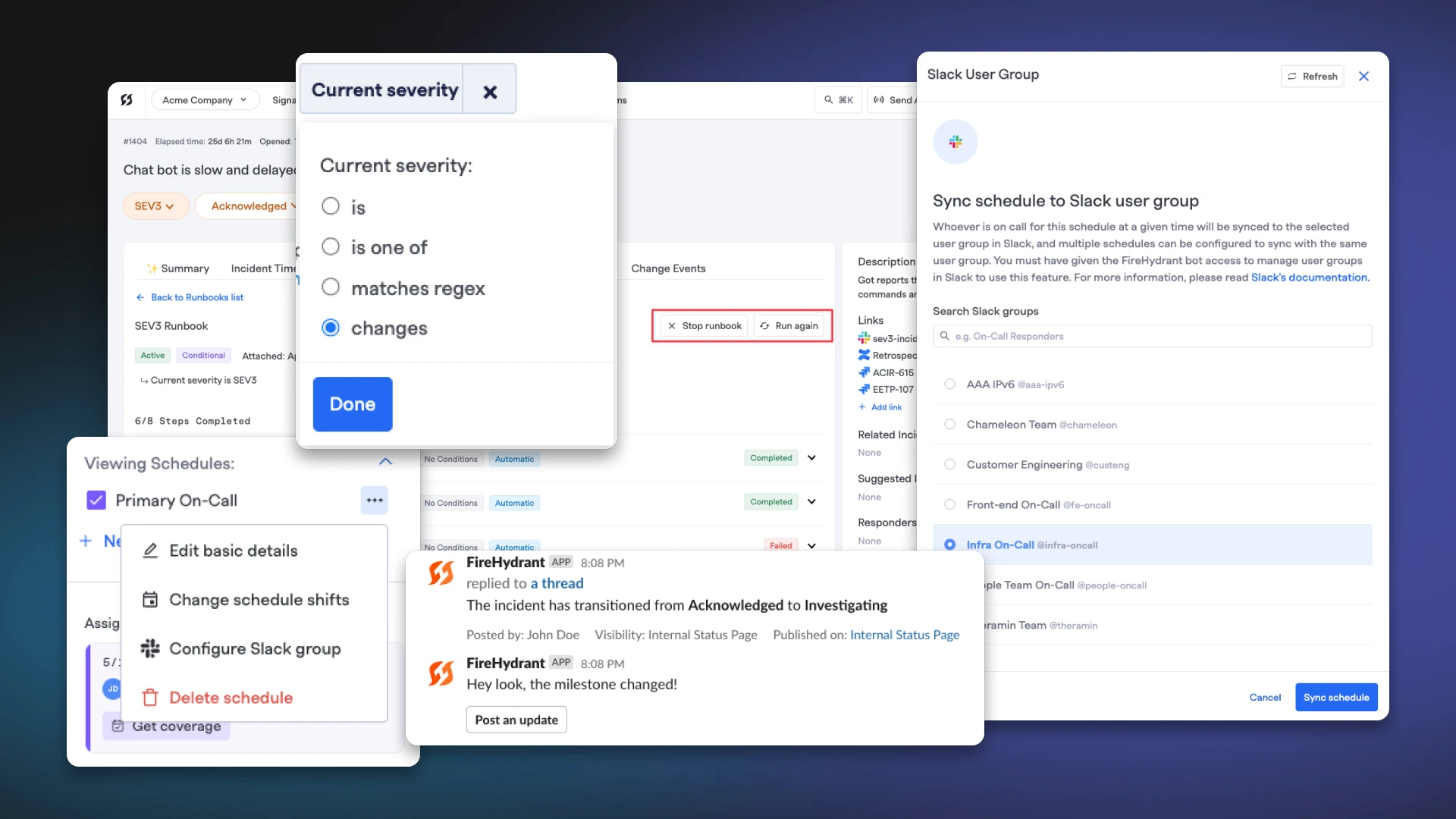On-Call Slack Groups

FireHydrant is excited to introduce Slack group syncing for on-call schedules! You can now point one or more on-call schedules at the same Slack user group and we’ll sync all of their on call users to that group. This makes it easy to sync all of a team’s schedules to a single Slack handle for the whole team.
To start using this feature, you need to first re-authorize your Slack integration as it requests additional scopes to modify Slack groups. You will also need to give the FireHydrant bot permission to manage user groups in your Slack workspace settings. Next, ensure there is a Slack group FireHydrant can start syncing with (e.g., "@database-oncall"). Then, go to your Team's page > On-Call Schedules and click the ellipses next to any schedule you'd like to start syncing with a Slack group handle!
Stop and Rerun Runbooks

We've added the ability to Stop and Rerun Runbook executions. Stopping a Runbook will immediately cease all of its steps and ask for a cancellation reason. Once provided, this logs an event in the timeline.
Rerunning a Runbook will stop/cancel any pending steps, and then re-execute all steps within the Runbook. No setup is necessary to use these features.
On Any Severity or Milestone Change Runbook Conditions

With Runbooks, FireHydrant users never had to understand the difference between "triggers" and "conditionals" - if an incident was e.g. SEV3, then the SEV3 Runbook would attach and execute. This allowed for powerful, flexible layering capabilities while keeping them easy to understand.
But of course, this led to a quirk - you had to specify explicit conditions, which in turn meant you had to know what a value (e.g., Severity) would change to. This doesn't work for workflows like "Send an email when the severity changes."
With feedback from customers, we've started adding "On Any Change" conditions to our Runbooks, starting with Severity and Milestones. You can find additional options in those conditions for "changes."
Other Fixes and Improvements
- 💅 We added a
firehydrant_ingest_urldata source in Terraform to fetch targeted webhooks for specific teams, users, and more. Docs here - 💅 In the milestones section of the Retrospective, we previously hid any milestones that did not have a timestamp. Now, we show them and add an action button to add a timestamp, making it easier to see which milestones are missing data
- 💅 Incident types can now be specified in the Signals Terraform. Docs here
- 💅 We've officially exposed the
/v1/metrics/mttxAPI endpoint so users can fetch the same data that we show on the MTTX Analytics page. We highly encourage users to switch to using this endpoint over the other metrics endpoints - 💅 We've added
tagsandcustomer_impact_summaryas additional fields in the incident CSV export - 💅 The Signals migration tool will now also create FireHydrant user blocks in the generated Terraform. This is highly useful for net-new customers migrating from other alerting providers to FireHydrant and have not yet configured their SSO
- 💅 We've exposed the
positionparameter for Severities API, allowing users to now re-order their Severities. This will impact the order everywhere Severities are selectable - 💅 We've added a Finland phone number to our pool of international voice callers. Remember to download and add the updated vCard!
- 🐛 We fixed an issue where if a monitoring tool sent us an Event saying an existing FireHydrant alert has been resolved, we wouldn't mark the Alert as resolved if it had already been acknowledged
- 🐛 When creating a Runbook from a suggested template, there was an issue with empty default values that prevented users from editing certain steps. This has been fixed
See FireHydrant in action
See how service catalog, incident management, and incident communications come together in a live demo.
Get a demo

